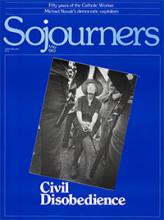Unless we are philosophical anarchists, most of us probably believe that it is right to obey most laws most of the time. (I say "most" because of that 30 m.p.h.. we've driven in a 25 m.p.h. zone.) We recognize that law is a valuable and necessary ordering force in human affairs. It has the potential to help make life both more peaceful and more just in everything from traffic regulations to protecting the civil rights of minorities.
Many people become so enraptured by the majesty of law, however, that they oppose breaking law under any circumstances. Society, they say, must be governed by the rule of law. Law creates structures of authority and justice, which, while admittedly imperfect, are much to be preferred to any lawless alternative. No one has the right to place themselves above the law, for to do so is arrogantly to become a law unto oneself. To pick and choose which laws one will obey or not obey leads to social disorder and, if widely practiced, to a chaos in which everyone's rights and liberties will be sacrificed.
Many Christians join in opposing any disobedience to law. They draw upon St. Paul's teaching in Romans 13 and other biblical passages, which they interpret as making unqualified claims for "civil obedience." According to this view, to resist the authorities and their laws is to resist what God has appointed. But how does this absolutist view of obedience to law stand up when we look at history?
Read the Full Article

